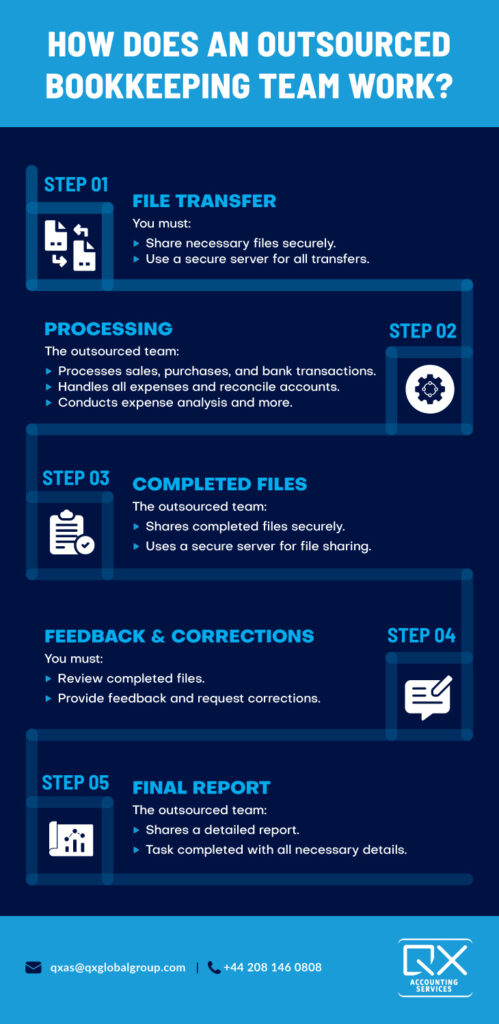
As 2025 nears, accounting firm owners are at the crossroads of tradition and innovation. The winds of change are blowing, and it’s time to set sail into the future of accountancy practices.
Automated bookkeeping is a technology-based approach that uses software to perform bookkeeping tasks like data entry, transaction categorization, and bank reconciliation with minimal human intervention. It helps accounting firms streamline tasks, improve accuracy, and boost efficiency with the right tools and strategies.
One of the most transformative tools available for this journey, alongside outsourced bookkeeping, is automation. In this blog post, we’ll explore the vast scope of bookkeeping automation, discuss why it’s crucial for the future of accountancy, and pinpoint specific bookkeeping tasks that can be seamlessly automated.
Automation is not just a buzzword; it’s a paradigm shift that empowers accounting firms to work smarter, faster, and with greater accuracy. Imagine a world where software handles mundane, repetitive tasks seamlessly, freeing up valuable time for accountants to focus on strategic decision-making and client relationships. Automation in bookkeeping extends its reach to various aspects of the financial workflow, from data entry to report generation.
In the fast-paced world of 2025, the demands on accounting firms will be greater than ever. Clients today expect real-time insights, regulatory compliance is ever-evolving, and competition is fierce. While bookkeeping outsourcing services ensure quality and greater capacity, automation in accounting firms emerges as the game-changer that can address modern challenges head-on.
Here are some compelling reasons why automation is necessary for a futuristic accountancy practice:
In the pursuit of a streamlined and futuristic accountancy practice, integrating automation can also be achieved through strategic outsourcing. Outsourcing certain bookkeeping tasks to specialised service providers not only allows accounting firms to leverage the expertise of professionals in the field but also opens doors to cutting-edge automation technologies.
Outsourcing partners often invest in state-of-the-art automation tools, relieving firms of the burden of acquiring and maintaining such technologies in-house. This collaborative approach not only enhances efficiency but also provides an opportunity for accounting firms to stay agile in a rapidly changing landscape.
Outsource bookkeeping UK to access the benefits of advanced technologies without the complexities of implementation, allowing you to focus on your core competencies and client-centric services.
Must Read: Embracing the Future: Automation in Bookkeeping for Accounting Firms

Automation in bookkeeping alleviates the burden of repetitive tasks, enabling accountants to focus on more strategic aspects of their work. This enhances productivity and helps prevent burnout by reducing the monotony associated with manual data entry and routine financial processes.
Automating bookkeeping streamlines tasks, improving efficiency and reducing errors. However, potential drawbacks include upfront costs for implementing automation tools and the need for ongoing monitoring to ensure accurate results. These downsides can be eliminated by partnering with a leading bookkeeping outsourcing services provider.
To automate bookkeeping, leverage accounting software like Xero or QuickBooks, integrate bank feeds for real-time transaction updates, and use AI-powered tools for invoice processing and reconciliation. Combine automation with outsourcing to streamline tasks and ensure accuracy.
Bookkeeping automation uses software to record, categories, and reconcile transactions automatically for accounting firms. It connects to bank feeds and accounting systems, reduces manual data entry, minimizes errors, and keeps client books up to date in real time.
Bookkeeping automation saves time, reduces errors, and improves accuracy. It allows firms to handle more clients efficiently, focus on advisory services, and deliver faster, reliable financial insights.
Tasks that can be automated include transaction recording, bank reconciliations, invoicing, expense tracking, VAT calculations, and generating basic financial reports. Some tools also auto-categorise data and send reminders.
Bookkeeping automation reduces manual data entry by importing and categorising transactions automatically. Built-in checks and reconciliation rules catch inconsistencies, ensuring more accurate and reliable financial records.
Bookkeeping automation is secure when providers use encryption, secure cloud servers, and access controls. Compliance with GDPR, regular backups, and audit logs further protect sensitive financial data.
Cost of bookkeeping automation for accounting firms in the UK:
Basic automation tools (e.g., document capture, transaction categorisation) can start from around £9–£10 per month.
More comprehensive solutions with full bookkeeping workflow automation may cost £30–£50+ per client per month, depending on volume and features.
As we prepare for 2025, the future of accounting is beckoning us toward innovation and efficiency. Automation in bookkeeping is not just a tool; it’s a catalyst for transformation. By embracing automation, UK accounting firms can elevate their practices, offering clients a level of service that aligns with the demands of the modern era. You can also integrate automation by teaming up with a reliable outsourced bookkeeping provider like QXAS.
It’s time to unlock your firm’s full potential and pave the way for a future where efficiency and excellence go hand in hand.
If you are keen to outsource your bookkeeping and drive transformation in 2025, QXAS can be your ideal partner. Our new-age outsourcing solutions are tailored to your needs, combining staffing, technology, and innovation to drive success for your firm.
Ready to get started? Call us at +44 208 146 0808 or fill in the form below to schedule a free consultation with our experts.
Deepika is a seasoned accounting professional with over 13 years of experience spanning the Indian, US, and UK markets. Her expertise covers audit, iXBRL, bookkeeping, VAT, taxation, and both management and statutory accounts preparation and review for limited companies, partnerships, and NRLs. She also brings specialised knowledge in conducting Independent Examinations for not-for-profit organisations, ensuring accuracy, compliance, and value-driven outcomes for diverse clients.
Unauthorized copying or plagiarism of our content is a violation of intellectual property rights. We take such matters seriously and will pursue legal action to protect our original work. Anyone found engaging in such activities will be held accountable under applicable laws.
Explore outsourcing solutions, request a free trial or discuss your practice’s needs with our expert consultants.